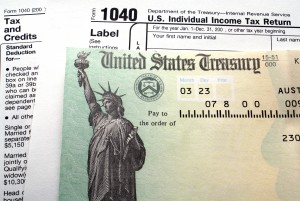By Matthew Loux, faculty member at American Military University
It’s tax time again. Many of you are likely expecting a tax refund, so the question is: What will you spend your refund on this year?

Many people think of their refund as new-found money and are inclined to spend it immediately. However, instead of buying that new gadget or booking a lavish vacation, here are five beneficial things to consider doing with your refund:
Contribute to an Emergency Fund: Financial emergencies can happen to anyone at any time. Make sure you’re prepared by using your tax refund to establish or contribute to an emergency savings fund. Emergencies can come in the form of a job loss, significant medical expense, or an unexpected home or auto repair. In such a situation, you do not want to rely on credit cards or loans, which could simply compound your financial problem. Many experts recommend having between three and six months’ worth of living expenses in an emergency fund. The amount of your emergency fund depends on whether or not you have children, carry substantial debt, and what type of insurance coverage you carry. I used $500 to start my emergency fund and budgeted money to grow the account.
Pay off Credit Cards or Loans: Americans continue to have substantial credit card debt. According to CreditCards.com:
- The average credit card debt per U.S. adult (excluding zero-balance cards and store cards) is $5,232
- The average debt per credit card that usually carries a balance is $7,494
- The average debt per credit card that does not usually carry a balance is $1,128
Credit cards carry high interest rates. In February 2015, the average interest rates are fixed rates of 13.02% and variable rates of 15.76%, according to Bankrate.com. Consider using your tax refund to reduce your credit debt and help you work towards being debt-free.
[Related article: Financial Fitness for Law Enforcement Officers]
Increase Your Retirement Plan: Use your refund to add to your retirement plan. There are many options, you can contribute up to $5,500 (or $6,500 if 50 or older) to an IRA and then withdraw the money tax-free in retirement. IRA rules change depending on your income and other factors, so talk to a tax professional or financial planner. If you work and your spouse does not, you can also contribute to a Roth IRA in his or her name if your joint income is within limits determined by the IRS. If you earn too much for a Roth, you can contribute to a nondeductible traditional IRA, then convert it to a Roth.
[Related article: Tips for Planning Your Retirement]
Improve Insurance Coverage: What better time than tax season to evaluate your insurance coverage and increase or change insurance policies. These can include health insurance, liability insurance, home and auto insurance, long-term disability, and long-term care insurance. Shop around to get the best prices and options.
Build a College Savings Plan: College is expensive. According to the U.S. Department of Education, for the 2011-12 academic year, the annual current dollar prices for undergraduate tuition, room, and board were estimated to be $14,300 at public institutions, $37,800 at private nonprofit institutions, and $23,300 at private for-profit institutions. Although your refund may not pay for either your education or your child’s education, you may find it will give you a jumpstart.
There are many other things you can do with your refund. Consider using your refund to:
- Give to charity
- Start a food storage plan to build personal food reserves
- Invest in new skills for your current or future career
- Prepay for your next vacation
- Start a side business
If your refund is substantial, consider giving yourself an immediate raise by adjusting your tax withholding to increase your take-home pay. Use a tax withholding calculator to figure out how many allowances you should claim, but be sure to consult a tax professional.
Whatever you decide to do with your tax refund, be sure to think it through before spending. Do not fall victim to impulsive spending. Remember, it may feel like your refund is new-found cash, but it is actually your money that you earned throughout the year. Be sure to spend it wisely and on something worthwhile and beneficial.
